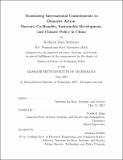Translating international commitments to domestic action : Mercury co-benefits, sustainable development, and climate policy in China
Author(s)
Mulvaney, Kathleen Mara
DownloadFull printable version (3.921Mb)
Alternative title
Mercury co-benefits, sustainable development, and climate policy in China
Other Contributors
Technology and Policy Program.
Advisor
Noelle E. Selin.
Terms of use
Metadata
Show full item recordAbstract
National commitments on the Paris Agreement on climate change interact with other global environment and sustainability objectives, such as the Minamata Convention on Mercury and the global Sustainable Development Goals. Understanding the interactions between climate change, air pollution, and sustainable development can help decision-makers identify more effective policies that can address environmental and economic goals simultaneously. To address environmental goals, I assess how mercury co-benefits (positive side effects that are peripheral to a policy's main goal) of a national climate policy in China could contribute to the country's commitments under the Minamata Convention. I examine climate policy scenarios in 2030 corresponding to various levels of carbon intensity reductions in addition to a business-as-usual scenario and an end-of-pipe control scenario that meets China's commitments under the Minamata Convention on Mercury. Economic analysis from a computable general equilibrium model of China's economy provides information on changes in economic activity resulting from the climate policy scenarios. Using the economic data from this model, I scale 2007 mercury emissions in a variety of sectors to 2030. I then use a global atmospheric transport model to project changes in mercury deposition at the regional scale in China for each policy scenario. I find that climate policy in China can provide mercury emissions and deposition co-benefits similar to end-of-pipe control policies that meet the country's Minamata Convention commitments. To address sustainable development goals, I investigate the use of the Inclusive Wealth Index for evaluating the sustainability of climate policy in China on the basis of produced capital, natural capital, and human capital at the provincial level. I find that most provinces in China exhibit an increase in Inclusive Wealth under several climate policy scenarios, providing an alternative metric for monetizing policy impacts.
Description
Thesis: S.M. in Technology and Policy, Massachusetts Institute of Technology, School of Engineering, Institute for Data, Systems, and Society, Technology and Policy Program, 2017. This electronic version was submitted by the student author. The certified thesis is available in the Institute Archives and Special Collections. Cataloged from student-submitted PDF version of thesis. Includes bibliographical references (pages 79-89).
Date issued
2017Department
Massachusetts Institute of Technology. Engineering Systems Division; Massachusetts Institute of Technology. Institute for Data, Systems, and Society; Technology and Policy ProgramPublisher
Massachusetts Institute of Technology
Keywords
Institute for Data, Systems, and Society., Engineering Systems Division., Technology and Policy Program.